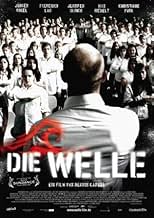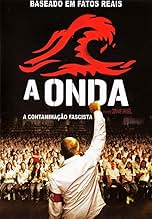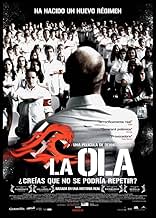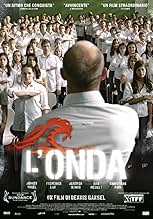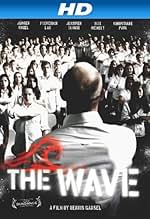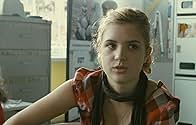CALIFICACIÓN DE IMDb
7.6/10
119 k
TU CALIFICACIÓN
El experimento de un profesor de instituto para demonstrar a sus estudiantes cómo es la vida bajo un régimen dictatorial se sale de control cuando forma una unidad social con vida propia.El experimento de un profesor de instituto para demonstrar a sus estudiantes cómo es la vida bajo un régimen dictatorial se sale de control cuando forma una unidad social con vida propia.El experimento de un profesor de instituto para demonstrar a sus estudiantes cómo es la vida bajo un régimen dictatorial se sale de control cuando forma una unidad social con vida propia.
- Dirección
- Guionistas
- Elenco
- Premios
- 9 premios ganados y 8 nominaciones en total
Opiniones destacadas
Die Welle (The Wave) is truly a brilliant tale that lures viewers into its cleverly developed plot just as Herr Wenger lures his unsuspecting students into a sense of fascism. When Wenger, an affable schoolteacher who seems to be rebellious towards traditional instruction, gets selected to teach a class on autocracy, he is upset. However, he soon devises a plan with which to teach the students a valuable lesson on the sheer dangers of fascism and the ease with which one can be lured into it.
His class starts out simple and nonthreatening. The students choose Wenger as their leader and are instructed to wear a uniform and create a name for themselves (the students choose Die Welle "The Wave"). But, this club slowly turns into a sort of fascist regime. The unsuspecting students think they are participating in some sort of fun club, but they are really being shown how easily impressionable people can be attracted by autocracy.
The biting irony of this film is that at the beginning of the autocracy class, Wenger touched on the subject of Hitler's reign, and the students almost instinctively spit out answers about how Germany would never fall into that trap again knowing what they know now. But, the children soon eat their words when they become members of a much less disturbing, yet frighteningly similar clique.
There is a glimmer of this fact when two students who aren't members of "The Wave" pick on a student who is. Two other members come to the rescue of the victim. Though many may view this as a positive aspect of this sort of togetherness, the point is that fascism has developed and can easily become corrupt.
I highly recommend this to any potential viewer who either holds the same views as the students at the beginning of the film or simply wants to be entertained by the ironic theme of the film (so long as you don't mind the subtitles).
His class starts out simple and nonthreatening. The students choose Wenger as their leader and are instructed to wear a uniform and create a name for themselves (the students choose Die Welle "The Wave"). But, this club slowly turns into a sort of fascist regime. The unsuspecting students think they are participating in some sort of fun club, but they are really being shown how easily impressionable people can be attracted by autocracy.
The biting irony of this film is that at the beginning of the autocracy class, Wenger touched on the subject of Hitler's reign, and the students almost instinctively spit out answers about how Germany would never fall into that trap again knowing what they know now. But, the children soon eat their words when they become members of a much less disturbing, yet frighteningly similar clique.
There is a glimmer of this fact when two students who aren't members of "The Wave" pick on a student who is. Two other members come to the rescue of the victim. Though many may view this as a positive aspect of this sort of togetherness, the point is that fascism has developed and can easily become corrupt.
I highly recommend this to any potential viewer who either holds the same views as the students at the beginning of the film or simply wants to be entertained by the ironic theme of the film (so long as you don't mind the subtitles).
"Die Welle" is an above average classroom drama with a political voice. Helmed by director Dennis Gansel, film is unforgiving in depicting the youth as a generation without anything to rebel about but loneliness, making them sensitive to any sort of illusion of belonging. Mostly a riveting affair, film lags in its second act as it jumps into Dawson's Creek. Film goes ashore into a memorable finale. Straight forward filming will captivate audiences, along with a pleasing cast.
Project week in a suburban high school entails them to study various forms of government and restriction. Rainer Wenger (Jürgen Vogel), an under-appreciated teacher finds a way in engaging his students. He cleverly manipulates his class to slap them out of apathy and disinterest with tiny minute changes which eventually builds up to a boil. Classroom scenes are stimulating as debates between the students are daring and engrossing writing mention controversial topics that are usually not spoken with lethargy. Film focuses on a group of smart people, highlighting further that what's bound to happen is even more tragic and rings a bell to what can happen out of celluloid..
Inspired by a 1960's social experiment in California documenting how easy it is to influence individuals, film looses track in its middle section as it begins to refocus on the individual lives of the students. Most characters seem to be run in the mill with general high school romance trouble, which would have been interesting but brings nothing new to the table. Stories work better as a collective rather than individuals, which further add to the intended effect. Some personalities shine though: students who never had any sense of belonging are indeed looked at with much heartbreak here as this false sense of security is embraced by them, motivating them to go a step further in preserving the society.
Finale is spellbinding as even if it diverts a lot from the actual experiment, it still proves as a necessity to further establish a point. Film parallels to the effect of Third Reich within its members and climax reminds audiences of the Bruno Ganz header "Der Untergang", as it clearly parallels the extent of loyalties that may arise in such occasions. From the get go, death of a character is imminent and even with its shock value, it justifies itself as beyond a plot device.
As an ensemble, the acting here is impermeable as they all deliver solid performances. Vogel especially convey solid work as the teacher. He brings gravity and his semi-bald haircut proves ominous. It's a shame that audiences lose connection to him midway though as he suddenly becomes the background to the melodrama.
German setting of the movie elevates the film's status. It creates this palpable undercurrent, that even with a country that already identifies itself as guilty; it still cannot escape the possibility of anarchy. Even if the picture becomes stern with its themes, it still is digestible to the mainstream. Word of mouth can secure a life outside the tills.
Project week in a suburban high school entails them to study various forms of government and restriction. Rainer Wenger (Jürgen Vogel), an under-appreciated teacher finds a way in engaging his students. He cleverly manipulates his class to slap them out of apathy and disinterest with tiny minute changes which eventually builds up to a boil. Classroom scenes are stimulating as debates between the students are daring and engrossing writing mention controversial topics that are usually not spoken with lethargy. Film focuses on a group of smart people, highlighting further that what's bound to happen is even more tragic and rings a bell to what can happen out of celluloid..
Inspired by a 1960's social experiment in California documenting how easy it is to influence individuals, film looses track in its middle section as it begins to refocus on the individual lives of the students. Most characters seem to be run in the mill with general high school romance trouble, which would have been interesting but brings nothing new to the table. Stories work better as a collective rather than individuals, which further add to the intended effect. Some personalities shine though: students who never had any sense of belonging are indeed looked at with much heartbreak here as this false sense of security is embraced by them, motivating them to go a step further in preserving the society.
Finale is spellbinding as even if it diverts a lot from the actual experiment, it still proves as a necessity to further establish a point. Film parallels to the effect of Third Reich within its members and climax reminds audiences of the Bruno Ganz header "Der Untergang", as it clearly parallels the extent of loyalties that may arise in such occasions. From the get go, death of a character is imminent and even with its shock value, it justifies itself as beyond a plot device.
As an ensemble, the acting here is impermeable as they all deliver solid performances. Vogel especially convey solid work as the teacher. He brings gravity and his semi-bald haircut proves ominous. It's a shame that audiences lose connection to him midway though as he suddenly becomes the background to the melodrama.
German setting of the movie elevates the film's status. It creates this palpable undercurrent, that even with a country that already identifies itself as guilty; it still cannot escape the possibility of anarchy. Even if the picture becomes stern with its themes, it still is digestible to the mainstream. Word of mouth can secure a life outside the tills.
This is my fourth German film and I'm digging them. Because you asked, I watched "Das Boot," "Downfall," and "Run Lola Run."
I thought "The Wave" was going to be corny. I thought it was going to be about a group of simple-minded kids following a leader because of some bromides. It wasn't that at all.
Rainer Wenger (Jurgen Vogel) was a teacher who was teaching a class on autocracy for project week. After a spit-fire discussion with the class about what autocracy is Mr. Wenger decided to do an experiment with the class. For project week only they would have to do what Mr. Wenger said. There were a few that resisted and left the class, but those who remained were all in. Slowly, we saw the evolution of a movement.
"The Wave" is the negative side of populism. I say that because the Wave, meaning the organization they formed, could easily have been something good. Mr. Wenger had his students doing very constructive and positive stuff. Who doesn't believe that there's strength in unity, who doesn't believe in equality, who doesn't believe in helping their fellow man? Plenty of organizations, religions, and movements purport similar beliefs and they are viewed as being good. It's when people use these goodly aims to form radical armies bent on purging, "cleansing," or otherwise harming those who don't think like them, that makes a movement into a gang. And if the movement is large enough to engulf an entire nation it becomes an autocracy.
"The Wave" gives food for thought. I think the larger lesson wasn't about being a part of something, I think it was about extremism. That very same group with more moderate participants could easily have been an asset to their school and their community. So I don't knock the Wave for its extremists anymore than I knock a religion for its extremists. Don't throw the baby out with the bath water.
I thought "The Wave" was going to be corny. I thought it was going to be about a group of simple-minded kids following a leader because of some bromides. It wasn't that at all.
Rainer Wenger (Jurgen Vogel) was a teacher who was teaching a class on autocracy for project week. After a spit-fire discussion with the class about what autocracy is Mr. Wenger decided to do an experiment with the class. For project week only they would have to do what Mr. Wenger said. There were a few that resisted and left the class, but those who remained were all in. Slowly, we saw the evolution of a movement.
"The Wave" is the negative side of populism. I say that because the Wave, meaning the organization they formed, could easily have been something good. Mr. Wenger had his students doing very constructive and positive stuff. Who doesn't believe that there's strength in unity, who doesn't believe in equality, who doesn't believe in helping their fellow man? Plenty of organizations, religions, and movements purport similar beliefs and they are viewed as being good. It's when people use these goodly aims to form radical armies bent on purging, "cleansing," or otherwise harming those who don't think like them, that makes a movement into a gang. And if the movement is large enough to engulf an entire nation it becomes an autocracy.
"The Wave" gives food for thought. I think the larger lesson wasn't about being a part of something, I think it was about extremism. That very same group with more moderate participants could easily have been an asset to their school and their community. So I don't knock the Wave for its extremists anymore than I knock a religion for its extremists. Don't throw the baby out with the bath water.
How does anyone really portray autocracy and/or fascism? In most ways, it can be done in the usual one-dimensional concoction of corruption, evil deeds, extreme delusion and paranoia amongst the ruling elites of the regimes. The Wave ("Die Welle") though looks at the issue from a different angle, examining how it can arise and entrance those it touches, and in the process makes the whole issue look fresh again.
The basic story is that of a school teacher (an anarchist at heart) who has to teach a class about "Autocracy". Failing to get their attention, he decides to create an experiment whereby they are to create their own mini autocracy and rules amongst themselves (named "The Wave"). With such a controversial subject, the whole thing gets out of hand with the pupils succumbing to the autocratic fascist methodology with grave consequences.
One important point that needs to be added is that its a German movie, and for historical reasons the topic is a delicate one, yet seems to add to the whole feel. The film is quite realistically disturbing in many ways, and shows how most of the pupils slowly fall for fascism in quite innocent ways. It will make you think and possibly reassess the important question, as asked in the film, if Autocracy can rear its head again.
The writing, the acting and direction are excellent. Jürgen Vogel as the class teacher is both entertaining and thoughtful in his role, but the cast in general is exceptional especially as in the main they are mostly teenagers.
If you like thoughtful films, and wish to see something that is questioning historical events in the present, then there is little to better this. Deserves to be watched. Its a film that will definitely be spoken about and re watched by many repeatedly for many years to come.
The basic story is that of a school teacher (an anarchist at heart) who has to teach a class about "Autocracy". Failing to get their attention, he decides to create an experiment whereby they are to create their own mini autocracy and rules amongst themselves (named "The Wave"). With such a controversial subject, the whole thing gets out of hand with the pupils succumbing to the autocratic fascist methodology with grave consequences.
One important point that needs to be added is that its a German movie, and for historical reasons the topic is a delicate one, yet seems to add to the whole feel. The film is quite realistically disturbing in many ways, and shows how most of the pupils slowly fall for fascism in quite innocent ways. It will make you think and possibly reassess the important question, as asked in the film, if Autocracy can rear its head again.
The writing, the acting and direction are excellent. Jürgen Vogel as the class teacher is both entertaining and thoughtful in his role, but the cast in general is exceptional especially as in the main they are mostly teenagers.
If you like thoughtful films, and wish to see something that is questioning historical events in the present, then there is little to better this. Deserves to be watched. Its a film that will definitely be spoken about and re watched by many repeatedly for many years to come.
This is a German film (subtitled) about a school project looking at autocracy (a la Nazi Germany). In order for the teacher to persuade his pupils that autocracy remains a real threat to democracy, he persuades them to take part in a class dictatorship. The key difference between this and your average school classroom is that he convinces the pupils not just to obey but also to want his every command. Of course the project turns bad and things get scary.
What I liked about the film was that it did not treat the pupils as "just kids"; they had brains, opinions, and their own ethics too. It is not a very black and white in it's opinion, you could draw some distinct opinion from the film but I suggest that there are several different opinions that are equally as valid. It keeps you guessing what is going to happen & even deliberately misleads you.
What I liked about the film was that it did not treat the pupils as "just kids"; they had brains, opinions, and their own ethics too. It is not a very black and white in it's opinion, you could draw some distinct opinion from the film but I suggest that there are several different opinions that are equally as valid. It keeps you guessing what is going to happen & even deliberately misleads you.
¿Sabías que…?
- TriviaBased on the novel "The Wave" by Todd Strasser (under the pen name Morton Rhue), a fictionalized account of the "Third Wave" teaching experiment by Ron Jones that took place in a Cubberley High School history class in Palo Alto, California in April 1967.
- ErroresAlthough set somewhere in western Germany, all policemen wear insignia of the state of Berlin.
- Citas
Rainer Wenger: So you don't think there could be another dictatorship in Germany?
Jens: No, we are too enlightened now.
- Créditos curiososOpening and closing credits appear as graffiti.
- ConexionesFeatured in Die Johannes B. Kerner Show: Episode dated 12 March 2008 (2008)
- Bandas sonorasRock 'n' Roll High School
Written by Joey Ramone, Johnny Ramone and Dee Dee Ramone
Performed by EL*KE
Produced by Mirko Schaffer
©1980 WB Music Corp. and Taco Tunes
Selecciones populares
Inicia sesión para calificar y agrega a la lista de videos para obtener recomendaciones personalizadas
- How long is The Wave?Con tecnología de Alexa
Detalles
- Fecha de lanzamiento
- Países de origen
- Sitio oficial
- Idioma
- También se conoce como
- La ola
- Locaciones de filmación
- Productoras
- Ver más créditos de la compañía en IMDbPro
Taquilla
- Presupuesto
- EUR 5,000,000 (estimado)
- Total a nivel mundial
- USD 32,350,637
- Tiempo de ejecución1 hora 47 minutos
- Color
- Mezcla de sonido
- Relación de aspecto
- 2.35 : 1
Contribuir a esta página
Sugiere una edición o agrega el contenido que falta

Principales brechas de datos
What is the Japanese language plot outline for Die Welle (2008)?
Responda




